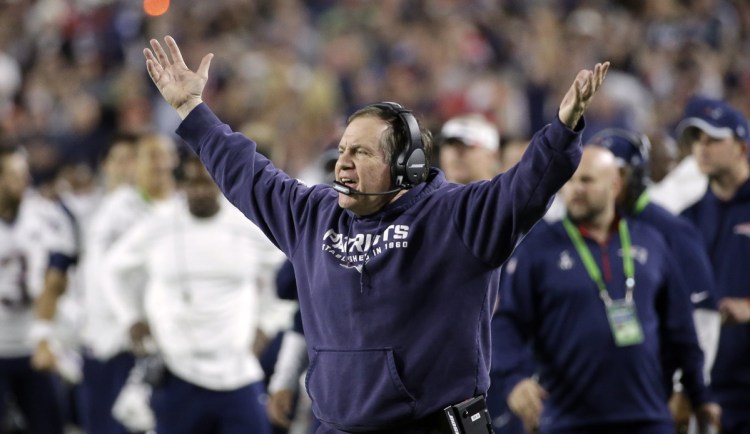In a league where success is fleeting, teams that lose a Super Bowl almost always experience some degree of regression the following season.
The numbers are staggering. Of the past 20 Super Bowl losers, only two returned to their conference championship game the next year: the 2012 Patriots and 2013 49ers. Both lost in that round. All but four teams went backward in the win column. More than half regressed by at least four regular-season wins.
And the stats aren’t much better for the past 20 Super Bowl champions, who struggled to defend their titles.
Consider: If your team made the Super Bowl last year, they’re almost three times more likely to miss the playoffs this season than qualify for the conference championship game (18 of the past 40 Super Bowl participants did not return to the postseason the next year, seven reached the AFC or NFC title game, four reached the Super Bowl).
Players recognize the extreme difficulty in making the climb back to the sport’s pinnacle. There’s an obvious emotional and physical toll. The losses linger. There’s a shorter offseason, less time to rest the body or recover from surgery. Players also recognize the parity in the league, the luck needed in a championship season and the undeniable trend that teams are likely to take a step backward following a Super Bowl appearance.
“Yes,” said former Patriots offensive tackle Sebastian Vollmer, “but I don’t think it applies to the Patriots.”
And he’s probably right.
The Pats are perennially 12-4, sometimes better. They returned to the NFL’s Final Four following Super Bowl appearances in the 2011, 2014 and 2016 seasons. They’re the exception.
“I love being a Patriot,” retired defensive end Rob Ninkovich said. “Every year you’re going to be right there (in contention), but you have to have the mentality of, ‘This is a completely new year.’ ”
How have they avoided the Super Bowl hangover? Nothing you haven’t heard.
“Coaching,” Vollmer said. “They’re not afraid to let go of players. If they see that (a player) might be wearing down or whatever it is, they’ll get somebody else. And (Coach) Bill (Belichick), him being able to adjust to what his team needs to do. And then, Tom (Brady), he’s like an iron man. He’s just out there all the time.”
According to Ninkovich, Belichick is exceptional at getting his team to turn the page, regardless of the previous result. On to Cincinnati. On to 2018.
Will that be the case after a stunning defensive collapse in the last Super Bowl and a dramatic offseason that included Brady skipping optional team activities? To be determined.
For the past 20 Super Bowl runners-up, the median outcome the following season was a 10-6 record and a loss in the wild-card round.
Several teams imploded, but this happened far more often in the early 2000s. Lately the only such example has been the 2016 Carolina Panthers, who improbably went from 15-1 to 6-10.
Over the past decade, Super Bowl losers generally have remained competitive the next year. They win, on average, 10.5 games and advance to the divisional round of the playoffs. But they just haven’t had the juice to go the distance. It’s difficult to discern exactly why.
Attempting to rebound from the disastrous ending of the Super Bowl, the 2017 Falcons were solid, but the loss of offensive coordinator Kyle Shanahan proved costly (Atlanta dipped from No. 1 in scoring offense to No. 15). The 2016 Falcons had the amazing fortune of the same starting offensive line for all 19 games. In 2017 the Falcons dealt with a normal rate of injuries up front. They were bounced in the divisional round.
Likewise, the 2015 Seahawks needed to replace defensive coordinator Dan Quinn following a Super Bowl loss to the Patriots. More importantly, they had three new starters on an injury-plagued offensive line. They also lost in the divisional round. It’s a familiar script.
“Football is a very unknown sport as far as injuries are concerned,” Ninkovich said.
One other factor: The past 10 Super Bowl losers went a combined 15-23 in games decided by three points or fewer the next season. The close losses affected playoff seeding, and many of those teams were forced to play on wild-card weekend. Made the road even tougher.
Are the Patriots immune?
“Um, I’m guessing?” former Pats receiver Wes Welker said, laughing. “I couldn’t really tell you. They’ve had it both ways so they probably know how to prepare for it better.”
This week the Patriots will reconvene, again beginning the long climb back to the top.
Send questions/comments to the editors.



Success. Please wait for the page to reload. If the page does not reload within 5 seconds, please refresh the page.
Enter your email and password to access comments.
Hi, to comment on stories you must . This profile is in addition to your subscription and website login.
Already have a commenting profile? .
Invalid username/password.
Please check your email to confirm and complete your registration.
Only subscribers are eligible to post comments. Please subscribe or login first for digital access. Here’s why.
Use the form below to reset your password. When you've submitted your account email, we will send an email with a reset code.